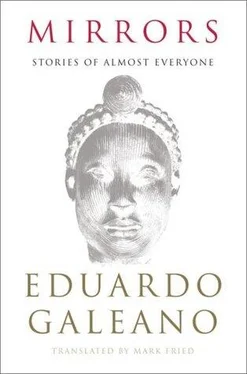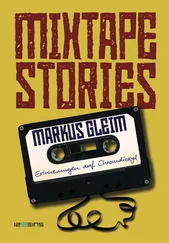the war drives peasants off their land, which then gets sold for little or nothing;
the war lines the pockets of arms smugglers and kidnappers, and grants sanctuary to drug traffickers for whom cocaine remains a venture in which Americans up north invest their noses and Colombians invest their dead;
the war murders so many labor activists that trade unions organize more funerals than strikes, and they stop bothering companies like Chiquita Brands, Coca-Cola, Nestlé, Del Monte, or Drummond Limited; and the war murders those who point out the causes of the war, making the war as inexplicable as it is inevitable.
The experts, known as violentologists, say Colombia is a country in love with death.
It is in the genes, they say.
A WOMAN ON THE BANKS OF A RIVER

It rains death.
In the deathmill, Colombians die by bullet or by knife,
by machete or by club,
by noose or by fire,
by falling bomb or by buried mine.
In the jungle of Urabá, on the banks of the Perancho River or the Peranchito, in her home made of sticks and palm leaves, a woman named Eligia fans herself to chase off the mosquitoes and the heat, and the fear as well. And while her fan flutters, she says out loud:
“Wouldn’t it be great to die a natural death?”

Advertising campaigns, marketing schemes. The target is public opinion. Wars are sold the same way cars are, by lying.
In August 1964, President Lyndon Johnson accused the Vietnamese of attacking two U.S. warships in the Tonkin Gulf.
Then the president invaded Vietnam, sending planes and troops. He was acclaimed by journalists and by politicians, and his popularity sky-rocketed. The Democrats in power and the Republicans out of power became a single party united against Communist aggression.
After the war had slaughtered Vietnamese in vast numbers, most of them women and children, Johnson’s secretary of defense, Robert McNamara, confessed that the Tonkin Gulf attack had never occurred.
The dead did not revive.
In March 2003, President George W. Bush accused Iraq of being on the verge of destroying the world with its weapons of mass destruction, “the most lethal weapons ever devised.”
Then the president invaded Iraq, sending planes and troops. He was acclaimed by journalists and by politicians, and his popularity sky-rocketed. The Republicans in power and the Democrats out of power became a single party united against terrorist aggression.
After the war had slaughtered Iraqis in vast numbers, most of them women and children, Bush confessed that the weapons of mass destruction never existed. “The most lethal weapons ever devised” were his own speeches.
In the following elections, he won a second term.
In my childhood, my mother used to tell me that a lie has no feet. She was misinformed.

Thousands of years before its devastation, Iraq gave birth to the first love poem in world literature:
What I tell you
Let the weaver weave into song.
The song, in Sumerian, told of the encounter of a goddess and a shepherd.
That night, the goddess Ianna loved as if she were mortal. Dumuzi the shepherd was immortal as long as the night lasted.

The war in Iraq grew out of the need to correct an error made by Geography when she put the West’s oil under the East’s sand. But no war is honest enough to confess:
“I kill to steal.”
“The devil’s shit,” as oil is called by its victims, has caused many wars and will certainly cause many more.
In Sudan, for instance, a huge number of people lost their lives between the final years of the twentieth century and the first years of the twenty-first, in an oil war that disguised itself as an ethnic and religious conflict. Derricks and drills, pipes and pipelines sprouted as if by magic in villages turned to ashes and in fields of ruined crops. In the Darfur region, where the butchery continues, the people, all Muslim, began to hate each other when they discovered there might be oil under their feet.
The killing in the hills of Rwanda also claimed to be an ethnic and religious war, even though killers and killed were all Catholics. Hatred, a colonial legacy, stemmed from the time when Belgium decreed that those who raised cattle were Tutsis and those who grew crops were Hutus, and that the Tutsi minority ought to dominate the Hutu majority.
In recent years, another multitude lost their lives in the Democratic Republic of the Congo in the service of foreign companies fighting over coltan. That rare mineral is an essential ingredient in cell phones, computers, microchips, and batteries, all of which are staples of the mass media. The media, however, forgot to mention coltan in their scant coverage of the war.

In 1975, the king of Morocco invaded the homeland of the Saharan people and expelled the majority of the population.
Today Western Sahara is the last colony in Africa.
Morocco denies it the right to determine its own future, and thus admits to having stolen a country it has no intention of returning.
The Saharans, “children of the clouds,” pursuers of rain, have been handed a life sentence of constant anguish and perpetual nostalgia. In the desert, independence is harder to come by than water.
A thousand and one times, the United Nations has spoken out against the Israeli occupation of the Palestinian homeland.
In 1948, the founding of the state of Israel led to the expulsion of eight hundred thousand people. The Palestinians took with them the keys to their homes, as had the Jews kicked out of Spain centuries before. The Jews were never able to return to Spain. The Palestinians were never able to return to Palestine.
Those who stayed behind were condemned to live humiliated in territories that are nibbled away at daily by relentless incursions.
Susan Abdallah, a Palestinian, knows the recipe for making a terrorist:
Deprive him of food and water.
Surround his home with the machinery of war.
Attack him with all means at all times, especially at night.
Demolish his home, uproot his farmland, kill his loved ones.
Congratulations: you have created an army of suicide bombers.

In the middle of the seventeenth century, Irish bishop James Ussher revealed that the world began in the year 404 before Christ, between dusk on Saturday, October 22, and nightfall the following day.
Regarding the end of the world, we don’t have such precise information. For sure, we fear its demise is not far off, given the feverish pace at which its murderers labor. The technological advances of the twenty-first century will no doubt equal the progress of the previous twenty thousand years of human history, but no one knows on which planet they will be celebrated. Shakespeare foretold it: “’Tis the times’ plague when madmen lead the blind.”
Machines built to help us live are helping us die.
Breathing and walking are forbidden in our great cities. Chemical bombardments melt the polar icecaps and the mountain snows. A California travel agency sells goodbye-glacier tours to Greenland. The sea eats away the shore and fishermen’s nets catch jellyfish instead of cod. Natural forests, riots of diversity, are turned into industrial forests or into deserts where not even the stones multiply. Since the beginning of this century, drought has put a hundred million peasant farmers in twenty countries at God’s mercy. “Nature has grown very tired,” wrote Spanish monk Luis Alfonso de Carvallo. That was in 1695. If only he could see us now.
Читать дальше


















